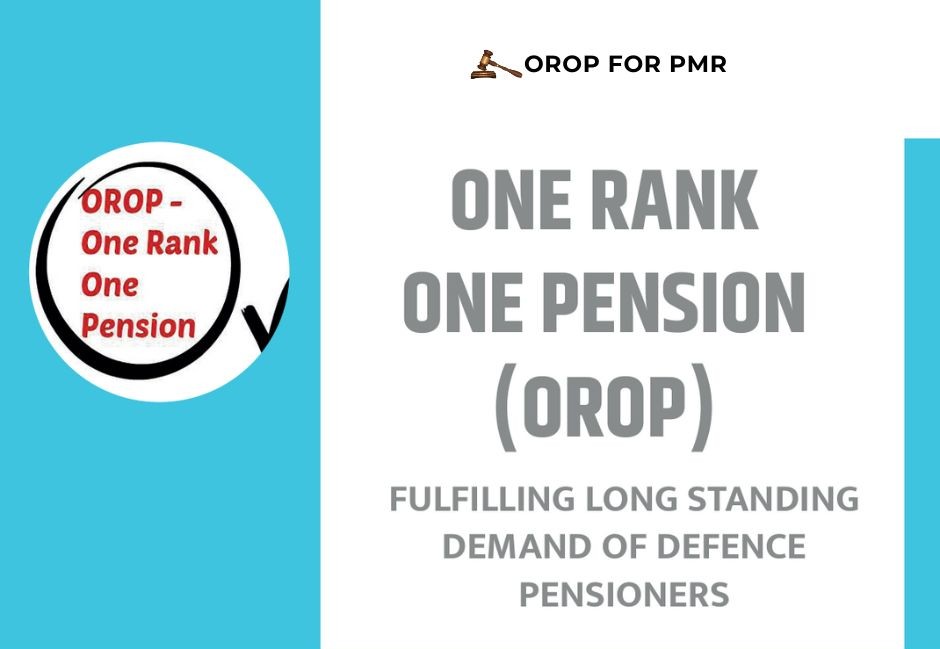
The Armed Forces Tribunal (AFT) Principal Bench Delhi recently made a landmark ruling, striking down a government policy that denied One Rank One Pension (OROP) benefits to pre-mature retirees (PMR). This decision has sparked considerable debate and has been hailed as a victory for military personnel who retired before the implementation of OROP, leading to a significant shift in how pension entitlements for former military personnel will be handled in the future.
Background of OROP and the Controversy
OROP is a pension scheme aimed at ensuring that military personnel, irrespective of when they retire, receive the same pension if they hold the same rank and have the same length of service. This scheme was introduced to address the disparity in pension payments that military veterans were receiving compared to those retiring in later years. However, the implementation of OROP was not without complications and controversies.
For decades, military pensioners had been advocating for a system where retired personnel would receive the same pension for the same rank and service, irrespective of their retirement date. This demand gained momentum with increasing public support and became a part of broader discussions about the welfare of ex-servicemen.
In 2014, the Indian government formally agreed to introduce OROP. However, there was a major issue with its implementation, as the government decided to make a distinction between those retiring before and after certain dates, leaving pre-mature retirees out of the benefits. This decision led to widespread dissatisfaction and legal challenges from military officers who felt that this differentiation was unjust.

The Armed Forces Tribunal’s Ruling
On January 31, 2025, the principal bench of the Armed Forces Tribunal in New Delhi, chaired by Justice Rajendra Menon and Rear Admiral Dhiren Vig (Retd), delivered a judgment that struck down the government order that denied OROP benefits to pre-mature retirees. The bench ruled that the exclusion of pre-mature retirees based solely on a cut-off date was a violation of Articles 14 and 16 of the Constitution, which guarantee equality before the law and equality of opportunity in public employment.
The petitioners involved in the case were a group of Army, Navy, and Air Force officers who had retired prematurely but were denied OROP benefits. They were divided into three categories based on their retirement dates:
- Category A: Pre-mature retirees who retired before July 1, 2014. They were included for OROP and had no grievances.
- Category B: Pre-mature retirees who retired between July 1, 2014, and November 7, 2015.
- Category C: Pre-mature retirees who retired after November 7, 2015. The petitions before the AFT were filed by those in Category C, who were not granted OROP benefits.
The ruling by the Armed Forces Tribunal specifically dealt with those in Category C, who were excluded from the OROP benefits because they retired after the cutoff date of July 1, 2014.
The Constitutionality of the Cut-off Date
The tribunal’s judgment is based on the premise that making distinctions between otherwise homogeneous groups of people based solely on a cut-off date is legally impermissible. The bench held that such a policy violated the constitutional guarantees of equality enshrined in Articles 14 and 16. These Articles mandate that the state cannot discriminate against citizens and must treat all similarly situated individuals equally.
The tribunal further stated that any classification of pre-mature retirees based on their retirement dates was unsustainable, as it lacked any reasonable justification. The court emphasized that a classification founded solely on a date does not serve any legitimate purpose and does not meet the criteria of a “reasonable classification,” which is required for any legal distinction under the Constitution.
Historical Context of the OROP Issue
The issue of pension disparity among retired military personnel dates back to the 1973 when the pension system for military personnel was altered by the Third Pay Commission. Prior to that, armed forces personnel had the parity of pension irrespective of the date of their retirement within a particular rank and service length. However, the 1973 reforms led to a discontinuation of this system, resulting in significant disparity in pension amounts.
This inequality persisted despite references to OROP in subsequent pay commissions, particularly the 5th and 6th Central Pay Commissions. It was not until 2004 that the government promised to implement OROP. However, in 2008, the government backed out of this promise, leading to widespread protests from war veterans, including the return of medals in protest.
In 2011, a parliamentary committee, known as the Koshiyari Committee, was set up to address the OROP issue. The committee’s findings were eventually accepted, and the government decided to implement OROP prospectively from the financial year 2014-2015. However, the implementation process left out certain categories of retirees, particularly those who retired after July 1, 2014.
The Legal Basis for the Tribunal’s Ruling
The AFT relied heavily on previous judicial precedents, particularly the ruling in the case of D S Nakara vs Union of India, which had established that any classification based on a cutoff date that divides a homogenous class is legally unsustainable. The court pointed out that such classifications violate the principle of equality before the law, as enshrined in the Constitution. The bench reaffirmed that the state is obligated to treat all similarly situated individuals equally and that the imposition of arbitrary cut-off dates is unjustifiable.
The ruling also reinforced that the state cannot absolve itself of its constitutional duty by invoking technicalities such as acquiescence or waiver. It further stressed that any differentiation among PMR personnel, without any valid rationale or connection to the objectives of the policy, amounts to an infringement of their constitutional rights.
Implications of the Ruling on OROP Benefits
The AFT’s ruling is a significant victory for military personnel who had been unfairly excluded from the benefits of OROP due to their premature retirement. The judgment now paves the way for the uniform implementation of OROP benefits for all pre-mature retirees, ensuring that they are treated equally, irrespective of their retirement dates.
The judgment also underscores the importance of upholding constitutional principles of equality and fairness in the implementation of government policies, especially when they concern the welfare of veterans who have dedicated their lives to serving the nation.
In conclusion, the AFT’s decision not only corrects an injustice but also sends a strong message about the importance of fair treatment for all members of the armed forces, regardless of their retirement date. This ruling will likely have far-reaching implications for future policies concerning the welfare of military veterans, ensuring that no one is left behind simply because of an arbitrary cutoff.
This decision is a big victory for PMR-affected pensioners. This benefit will be available only to those who take legal action. Join us and file a case collectively to secure your rightful legal entitlement Click here to Join to file the case
ALSO READ I SUPREME COURT URGES GOVERNMENT TO STOP BURDENING VETERANS WITH LEGAL BATTLES





